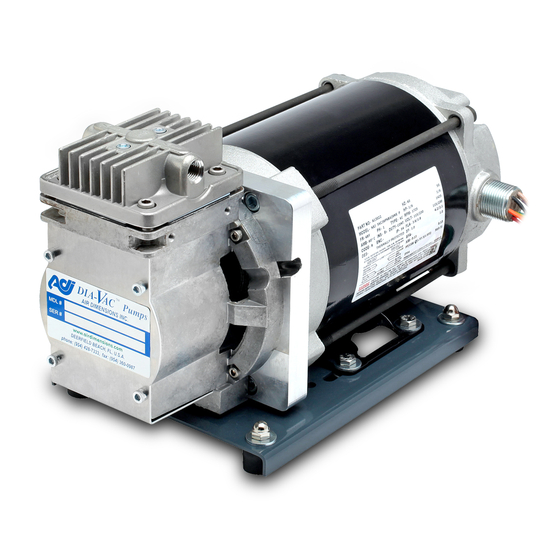Air Dimensions Incorporated Dia-Vac R Series 사용 설명서 - 페이지 3
{카테고리_이름} Air Dimensions Incorporated Dia-Vac R Series에 대한 사용 설명서을 온라인으로 검색하거나 PDF를 다운로드하세요. Air Dimensions Incorporated Dia-Vac R Series 11 페이지. Elevated/extended pump with explosion proof motor

Operation
No oiling or other lubrication is necessary with a Dia‐Vac® pump.
If the gas stream has a high level of particulate matter, a filter should be installed before the pump. If the
gas stream has a high level of liquid matter, a membrane separator should be installed before the pump.
This should be used in conjunction with best practices for pump installation including mounting the pump
head so that the discharge port faces toward the ground. Keep in mind that the pump head can be rotated
in any direction on the housing. The gas will always flow in the direction of the arrows on top of the head.
The elevated and extended pumps are for use in hazardous areas where heated heads cannot be used to
prevent condensation buildup in the pump. These pumps are designed to have head or heads mounted
in a heated enclosure to prevent condensation of vapors within the pump head. The plate of either of
these pumps can hold the entire weight of the pump.
This pump can be mounted in any position. If the housing needs to be rotated for mounting purposes,
that can be done at the ADI facility.
Do not start the pump against pressure or vacuum. For applications that must start under pressure or
vacuum, contact ADI and a suitable motor will be selected.
Running amps are listed on the nameplate of the motor. A pump running at a substantially higher current
than shown on the motor plate indicates a problem, please see section "Troubleshooting" below. Please
note that the current draw at the startup of the pump will be three to four times the normal running
amps.
For high pressure applications, outlet pressures above 15 psig, please consult an ADI representative for
proper motor sizing.
The pump is designed for atmospheric pressure or vacuum on the inlet. For applications with inlet
pressure greater than 0 psig; contact ADI and a suitable pump will be selected.
The diaphragm, valve discs, sealing washer, and gasket are the only consumable parts of the pump. The
degree of usage and condition of operating temperatures or pressure will determine the rate of
replacement of part or parts. For heavy loads (25‐75 PSI) and constant operation the diaphragm should
be inspected at least every six months. For lighter loads (0‐15 PSI or up to maximum vacuum) or pumps
with reduced eccentric the diaphragm may operate successfully for a year or more. The corrosive content
of the gas media being pumped can affect the recommended inspection and replacement cycle of the
diaphragm.
The minimum performance acceptable of a single head of an R‐series pump is shown in the table below.
Pumps operating at 50 Hz have a 17 percent lower flow rate than their 60 Hz counterparts. To check
pumping efficiency, employ suitably damped gauges connected so as to dead‐head either pressure or
vacuum.
3
